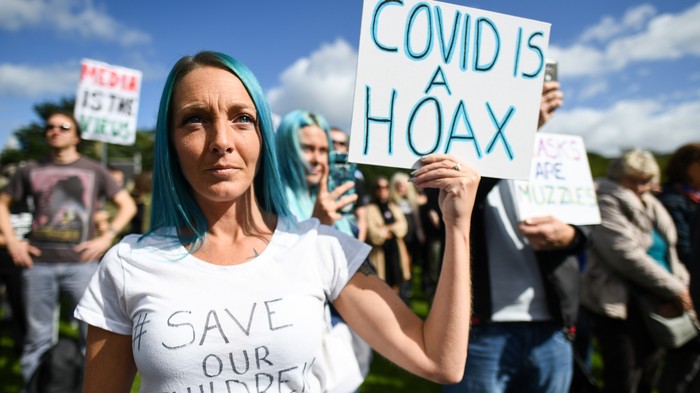Conspiritualidade
Enviado: Sáb, 16 Janeiro 2021 - 22:13 pm
‘Conspirituality’ Explains Why the Wellness World Fell for QAnon

https://www.vice.com/en/article/93wq73/ ... -for-qanon

Continua aqui:The term “Conspirituality,” a mash-up of the words conspiracy theory and spirituality, was first proposed in 2011 by anthropologists Charlotte Ward and David Voas, who noticed that sometimes, those with spiritual or alternative beliefs are especially prone to conspiracy-like thinking. The concept has only become more relevant since; there's now even a podcast documenting this phenomenon, called Conspirituality.
What we mean by "spiritual or alternative beliefs" here involves different but intersecting modern movements, from New Age-y ideas about spiritual energy to psychonauts, certain yoga communities, "natural parenting," and parts of wellness culture—a secular practice that nevertheless dabbles in things like crystals, Reiki, and alternative medicine.
Jules Evans, a philosopher and research fellow at the Center for the History of the Emotions at Queen Mary, University of London, wrote in April that in some ways, the current rise in conspiracy thinking is predictable. “The pandemic has led to a breakdown in knowledge and certainty,” he wrote.
But what about the vulnerability of the wellness and New Age communities? Was that predictable too?
According to Evans, we can attempt to understand “conspirituality” through the underlying personality traits and ways of thinking that conspiracy theorists and those engaging in various kinds of alternative, or spiritual beliefs have in common—as well as the political, environmental, and technological contexts that breed this sort of convergence.
Once we're aware of these crossovers, perhaps people who are interested in spirituality will be better able to resist conspiracy theories. Evans advocates for a kind of critical spirituality or wellness, in which people can access the beneficial sides of spirituality or wellness, minus Pizzagate or the perils of 5G. This practice might involve checking sources, confronting confirmation biases, and critically reflecting on our own beliefs and experiences. To achieve this though, we have to first grapple with conspirituality.
Evans doesn’t approach this topic from the perspective of a debunker or a condescending outsider. He's a proponent of Western spirituality himself, but that’s why he’s been so troubled to see leaders within his own community falling prey to conspiratorial thinking.
https://www.vice.com/en/article/93wq73/ ... -for-qanon